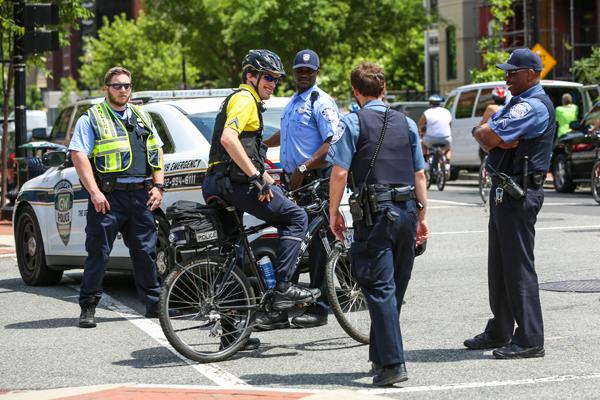The University Police Department is taking the lead in bike training officers from other institutions, UPD Chief RaShall Brackney said.
UPD officers go through urban bicycle training to create a closer community connection and as a part of GW’s sustainability programs, Brackney said. The University has hosted collaborative police trainings with other departments, and one officer who trains bike patrolling officers said GW has some of the top instructors in the area.
“This joint training has been especially helpful in building relationships with our colleagues at other campuses,” Brackney said.
Brackney did not say which departments have trained with GW, but she said hopes the bike program will allow for campus police officers to work more directly with their communities — a strategy that she has promoted since arriving at the University last year.
“An officer riding a bike removes the physical aspect of an officer sitting inside a patrol car, and it also allows an officer to maneuver into tighter areas such as sidewalks on an urban campus,” she said.
The program at GW requires officers to attend a one-week certification program under the standards of the International Police Mountain Bike Association and complete 40 hours of additional biking with officers in parking lots near campus, she said.
“This training time also lends itself to great team-building experiences,” Brackney said.
Brackney added that UPD collaborates with D.C. universities through the Consortium of Universities for the Washington Metropolitan Area. She, along with the police chiefs from the 13 other universities involved in the organization, sit on the organization’s campus safety committee to discuss safety information and resources.
Maureen Becker, executive director of IPMBA, said in an email the company trains GW officers and officers at Georgetown, American and Catholic universities.
“Candidates are required to pass a written test as well as practical tests assessing their bike handling and vehicular cycling skills,” Becker said.
The nonprofit organization has a network of about 650 instructors in the U.S. Officers working toward IPMBA certification have to undergo 32 hours of training for bike fit and maintenance, obstacle avoidance, night operations and slow speed skills, Becker said.
Lt. Bruce Jackson of George Mason University’s police department, who has been a bike patrol instructor for 25 years, said GW has top-notch instructors on staff to train other officers in the department or other departments’ officers.
“GW has some very good instructors at bike patrol,” Jackson said.
The training program that Jackson hosts at George Mason is voluntary, because some officers will not be able to pass the necessary trainings, he said.
“Some people aren’t capable of handling the bikes — they are not easy tools,” he said. “You have to learn how to use the bikes without running people over.”
The bike safety patrol program at George Mason consists of 16 to 20 hours worth of classroom theory on top of 20 to 22 hours of bike operation. Potential bike patrollers learn how to operate in condensed spaces using a cone obstacle course and how to use the bike as a tool for safety, at night and for long distances.
American University Chief of Security Phillip Morse said the university’s department has used bike patrol officers since 2012 and believes that bike patrols can be as good, if not better, than having officers on foot or in squad cars.
“The police officers are accessible to the community and allow for great interaction, unlike squad cars that have their windows rolled up,” he said. “And they don’t use gas and they’re clean. They’re a great way for police to patrol a large area.”







